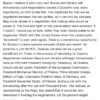🔴 Website 👉 https://u-s-news.com/
Telegram 👉 https://t.me/usnewscom_channel
The fiscal crisis looming over Chicago, Los Angeles, and Philadelphia is a stark testament to years of neglected financial oversight, calling for immediate and sustainable reform.
At a Glance
- U.S. cities face budget deficits as pandemic-era stimuli end and inflation persists
- Chicago anticipates a $1.2 billion fiscal gap by 2026, strained by pension liabilities
- Los Angeles confronts a projected $1 billion deficit by fiscal year 2025-2026
- Philadelphia’s school district faces a $300 million shortfall
Chicago’s Mounting Fiscal Pressure
Chicago’s financial landscape is grim, with a projected $1.2 billion budget deficit by the fiscal year 2026. A combination of rising personnel costs and massive pension liabilities exacerbates the problem, consuming a staggering 63% of the city’s corporate fund. High pension liabilities, a longstanding issue in Illinois, further complicate the city’s economic recovery. Brandon Johnson’s administration faces an uphill battle in addressing these challenges while grappling with crime and a migrant housing crisis.
Los Angeles’ Budgetary Woes
Los Angeles faces a financial shortfall nearing $1 billion by 2025-2026, driven by extensive wildfire relief efforts, legal expenses, and increased payroll costs. In response, Mayor Karen Bass proposed over 1,600 government job cuts in efforts to address budgetary constraints. Marc Joffe,a visiting fellow at the California Policy Center aptly stated, “Los Angeles has one unique problem relative to other blue cities which is it is suffering from the aftereffects of the wildfires in January.” This highlights the compounded fiscal challenges the city must overcome.
Philadelphia’s Heightened Fiscal Risks
Philadelphia’s financial stability stands on shaky grounds, with its school district bracing for a $300 million deficit by fiscal year 2026. Attempts to bridge the gap include utilizing 40% of reserves amidst escalating operational costs. Additionally, SEPTA, the city’s public transit system, faces its own $213 million shortfall, suggesting fare hikes and service cuts on the horizon. This alarming trend underscores the grave need for strategic financial planning to avert fiscal collapse.
As the recovery from federal pandemic relief funding dwindles, cities confront relentless financial challenges. Inflation’s pressure, ongoing structural deficits, and systemic fiscal issues necessitate rigorous budgetary discipline. The looming deficits in major blue cities reflect broader financial disarray that requires transparent management and robust fiscal policies. Only through decisive action can these cities restore economic balance and secure a financially sustainable future.
Conclusion: Facing Fiscal Reality
The fiscal challenges besieging Chicago, Los Angeles, and Philadelphia serve as critical reminders of the urgent need for financial reformation. With underfunded pensions and high public expenditure, these cities are at a financial crossroads. Michael Rinaldi, senior director at Fitch Ratings public finance group‘s observed, “Clearly there are significant capital needs across the U.S.,” encapsulates the broader fiscal crisis confronting urban centers. Remaining vigilant is paramount to reverse financial erosion and ensure municipal longevity.
“Chicago has infamously bad finances, As far as the budget, it lays out power for the mayor and city councils, so for example, in some [Illinois] cities voters have to approve property tax hikes, and Chicagoans don’t get to do that.” – Dylan Sharkey, an assistant editor at the Chicago-based think tank Illinois Policy Institute (IPI)
The fiscal stability of America’s urban centers hinges on courageous financial management and reformative strategies. These steps are essential to address the prevalent deficits and revive the promising potential of these iconic cities.

